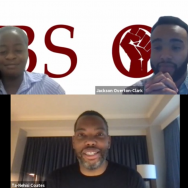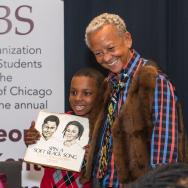Ilyasah Shabazz didn’t duck the past as she delivered the University of Chicago’s annual George E. Kent Lecture. She shared poignant personal stories, including about the day in 1965 that her father, civil rights leader Malcolm X, was assassinated. But she didn’t linger there.
Instead, the New York-based author and educator pulled her audience into the present, challenging them to step up and “engineer a new future” by working together.
“Inequality still stands in the way of progress,” Shabazz said April 28 at a packed Keller Center event. “And as we gather to fight for justice, we must ask if not now, then when?”
“Dr. [Martin Luther] King's words still ring true: The arc of the moral universe is long, but it bends toward justice. But we need to add Malcolm's caveat: The arc of the moral universe won't bend on its own. It requires individual and collective effort. We must work together, pray together, walk together, and stand together,” she said. “We must continuously seek to support one another and push to find our way forward together.”
Shabazz, co-chairperson of the Malcolm X & Dr. Betty Shabazz Memorial and Educational Center and adjunct professor at John Jay College of Criminal Justice, is the latest of leading Black scholars, writers, and activists to headline the lecture, which has been given since 1984. It honors Kent, a literature scholar who died in 1982 and was one of the first Black professors to receive tenure at the University of Chicago.
Hosted by the Organization of Black Students (OBS) in partnership with the Harris School of Public Policy, the 90-minute featured the lecture; a discussion led by Jordyn Varise, OBS political chair; and a question-and-answer session. The event was also live-streamed for viewers beyond the Keller Center.
Shabazz initially took her audience back to Feb. 21, 1965, when three gunmen killed her 39-year-old father in Harlem’s Audubon Ballroom. He was about to give a speech about the Organization of Afro-American Unity, the group he formed after leaving the Nation of Islam. His family, including a 2-year-old Ilyasah, was there.
“My pregnant mother placed her body over my three sisters and me to protect us from gunfire and to make sure we would not see the terror before us,” Shabazz said.
Afterward, though Malcolm X “was physically gone, my mother made certain that her husband remained a part of our household conversations for as long as I can remember,” she said. “I knew my father loved me. I knew he had impeccable integrity and a great sense of humor. … I knew he loved music, literature, poetry, history, nature, and the arts.”
“We have beautiful butterfly and poetry collections that were his,” she added. “We had his clothes, his briefcase, and his size 14 shoes that we would put our feet in and try to romp around in.”
It was only in college, Shabazz said, that she began to learn about what she termed “the inaccurate portrayals of his character and life's work.” “I started to understand why my mother protected us from the negative depictions of her husband.”
“The story that has been written of Malcolm is so far from the truth,” she said.
Inaccuracies, she said, include descriptions of the relationship between her father and Dr. King. Malcolm X criticized the mainstream civil rights movement and he and King clashed, particularly over King’s nonviolent approach to ending racial discrimination. But, Shabazz said, the men “saw themselves as brothers,” not enemies.
“People often come, and they whisper to me that they were on the side of Malcolm or that they were on the side of Martin,” she said. “But ladies and gentlemen, we do not have to choose sides. Both men challenged an unjust and immoral world. Even though they have their philosophical differences—my father's point of view was human rights and Dr. King's point of view was civil rights—both were needed to accomplish our ultimate goal.”
“Why can't we appreciate both for their undying love and commitment for their people?” she asked, adding that her mother and Coretta Scott King became friends, as did she and King’s daughter Bernice. “We're not rivals. We're sisters.”
To link her father’s actions to the America of today, Shabazz reached back to 1957 when Malcolm X led a march to a New York City police station to demand medical treatment for a Nation of Islam member who had been beaten by officers and then detained. When officers finally took the injured man to Harlem Hospital, the protesters followed—a scene that’s dramatized in Spike Lee’s 1992 film Malcolm X.
“That evening each Nation of Islam member called two members and it became a domino effect,” she said, “much like with the protests that followed the murder of George Floyd.”
Those protesters 65 years ago did not quit until they accomplished their goal, and “their united spirit of organized activism has much to teach us today,” she added.
After Floyd’s 2020 murder by a police officer in Minneapolis, she said, “we went out marching, protesting, demonstrating. But then the marching, protesting, demonstrating was over—and we went back home. And then you had to say, ‘Well, what did I accomplish?’ It's so important that we know what we are marching for. What is our goal?”
One goal in what she described as today’s challenging times is “creating a society that works for everyone. And this means challenging systems that maintain disproportionate incarceration rates of young Black men, systems that create racial disparities in child poverty. Clinging to hope, we must propose legislation that combats injustice.”
When, she said, “we learn that we can only win together, we will stop focusing on what divides us.”
That thinking made an impression on second-year undergraduate Esi Koomson, OBS co-president, who said her biggest takeaways from the lecture were recognizing “the importance of collective action as well as understanding just how much work needs to be done.”
Shabazz “really hit home on the idea of the need to push forward,” said Sheila Tume, a second-year undergraduate student and OBS secretary.
Meanwhile, Cyrah Gayle, a first-year undergraduate student focusing on business and critical race and ethnic studies, was impressed by how Shabazz “made her own way and didn’t stay in the shadow of her parents.”
Shabazz was “such an inspiration,” said Varise, who also introduced the speaker at the start of the program.
As she neared the end of her remarks, Shabazz turned to a source of her inspiration, capping a call to action with words made famous by her father so long ago.
“This is our moment right now,” she said. “It is our responsibility to build and organize community networks, stand up for those who cannot stand for themselves, and make our voices heard, by any means necessary.”
—This story was first published by the Harris School of Public Policy.

